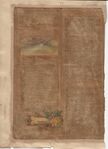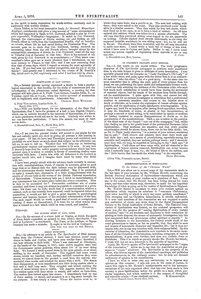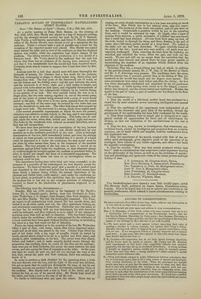HPB-SB-7-72: Difference between revisions
mNo edit summary |
mNo edit summary |
||
| (2 intermediate revisions by 2 users not shown) | |||
| Line 8: | Line 8: | ||
{{Style P-HPB SB. Title continued |Indian Mysticisms|7-71}} | {{Style P-HPB SB. Title continued |Indian Mysticisms|7-71}} | ||
... | {{Style P-No indent|where they came from, was a puzzle to us. The men had nothing with them; they were naked to the waist. They also produced cocks’ heads alive in a similar manner. They then asked for four bed sheets, which they fixed up in the open, so as to form a kind of cabinet. An old man entered this cabinet, which was taken down a minute afterwards. The old man was then perceived sitting cross-legged in the air, apparently on nothing. Officers slashed their swords underneath, to cut away the supposed invisible machinery he was sitting upon; but, no, he still sat in the air. The sheets were then re-erected, and the old man descended to earth once more. I could write a book full of things of this kind, which I have seen in Ceylon and India. Suffice to say, I never came across any person capable of explaining these marvels to me or any one else.}} | ||
{{Style P-Signature in capitals|J. Cain.}} | |||
8, Bloomfield-row, Bow, London. | |||
| Line 33: | Line 37: | ||
| item =2 | | item =2 | ||
| type = letter | | type = letter | ||
| status = | | status = proofread | ||
| continues = | | continues = | ||
| author = Kislingbury, E. | | author = Kislingbury, E. | ||
| Line 39: | Line 43: | ||
| subtitle = | | subtitle = | ||
| untitled = | | untitled = | ||
| source title = | | source title = London Spiritualist | ||
| source details = | | source details = No. 293, April 5, 1878, p. 167 | ||
| publication date = | | publication date = 1878-04-05 | ||
| original date = | | original date = | ||
| notes = | | notes = | ||
| Line 47: | Line 51: | ||
}} | }} | ||
... | <center>''To the Editor of the ''“''Christian World.”''</center> | ||
{{Style S-Small capitals|Sir}},—Will you allow me to correct some of the statements made in the last issue of your journal, by Mr. William Howitt, concerning the British National Association of Spiritualists—statements which are likely to mislead many of your readers as to questions of fact. I may say, at the outset, that Mr. Howitt has been living abroad for some years, and that some excuse may, therefore, be made for his imperfect knowledge of what is going on in the matter of Spiritualism in England. | |||
Mr. Howitt thinks it necessary to warn your readers against an association which requires its members to “renounce Christianity, their utter hostility to which is every day more publicly manifested.” This sweeping and un-Christian denunciation is utterly unfounded. It ''is ''true that members of the Association are not required to make any confession of creed, any more than in the Royal Geographical Society or the Royal Institution of Great Britain. The National Association of Spiritualists was formed, as the enclosed prospectus will show you, for the purpose of “uniting Spiritualists of every variety of opinion,” and “to aid students and inquirers in their researches by placing at their disposal the means of systematic investigation into the now recognised facts and phenomena called spiritual or psychic.” In electing members to the Association, the Council avails itself of the usual precautions to insure, as far as possible, that they shall be men and women of honourable character and blameless life; but it does not inquire into, nor in any way interfere with, their religious belief. By this exercise of toleration, the Association now numbers in its ranks members of all the Churches of Christendom, including clergymen of various denominations; it goes even further, and does not exclude Jews or Buddhists. This it is which so greatly shocks Mr. Howitt, but which, I trust, will not act as a deterrent to the majority of inquirers. | |||
Again, Mr. Howitt speaks of'' The Spiritualist ''newspaper as the ''u ''organ of the Association.” Allow me to say that the Association as yet possesses no “organ” whatever. ''The Spiritualist ''is the property of its editor, who inserts reports of the Association’s meetings, and publishes its advertisements, in the ordinary course; but he does not demand uniformity of opinion in his contributors. | |||
I have no wish to enter into any controversy, or to express any opinion on this occasion. I only ask you, in the cause of justice, to insert this reply to Mr. Howitt’s misstatements, and to his misrepresentations of the only organised effort that has ever been made in this country to place Spiritualism before the public on a basis which precludes imposture, and which entitles it to the respect of thoughtful and scientific minds.—Your obedient servant, | |||
{{Style P-Signature in capitals|E. Kislingbury.}} | |||
38, Great Russell-street, March 23rd, 1878. | |||
| Line 72: | Line 88: | ||
| item =4 | | item =4 | ||
| type = letter | | type = letter | ||
| status = | | status = proofread | ||
| continues = | | continues = | ||
| author = | | author = | ||
| Line 78: | Line 94: | ||
| subtitle = | | subtitle = | ||
| untitled = | | untitled = | ||
| source title = | | source title = London Spiritualist | ||
| source details = | | source details = No. 293, April 5, 1878, p. 168 | ||
| publication date = | | publication date = 1878-04-05 | ||
| original date = | | original date = | ||
| notes = | | notes = | ||
| Line 86: | Line 102: | ||
}} | }} | ||
... | {{Style S-Small capitals|We}} have received a Post-Office Order from India, without any information as to who sent it, or what town it came from. | ||
A. H.—You should put your name and address to your communications. | |||
{{Style S-Small capitals|Mrs. J. B. Mitchell}}, of New York, writes with some warmth that she is not a Spiritualist, but a communicant in the Presbyterian church; that she has known Madame Blavatsky for three years; that Madame Blavatsky is a truthful woman, living a good life, and that the questioning of the ''bona fide'' nature of her writings by Mrs. Showers is not well founded. | |||
{{Style P-HPB SB. Restored}} | |||
X.—We have never said a word against writers exercising their right of sending a circular to various journals, but against their doing it surreptitiously, leaving each editor to suppose he has a special contribution, when it is ''not ''one. It is a recognised breach of literary etiquette and of natural good taste. A man some time since played us this trick about four times, then denied that he had done so. | |||
T. E., Croydon.—No connection has as yet been traced between electricity and the forces used by spirits at ''stances. ''Mr. Yarley and Mr. Harrison tried experiments on this head, with exquisitely delicate and sensitive apparatus, but the raps set up no electrical disturbance. A strong medium is usually an impulsive person, readily put to sleep by mesmeric passes. It has been said that when a strong medium is ''u ''under control,” a mortal mesmerist cannot influence him. | |||
B.—When individuals attempt to make differences between principals, try to keep them apart, then to let a long course of slander and innuendo, from several directions, do its work. When the principals are upright people they know at once that the assertions must be false, and that they have to deal with individuals who indulge in the ''suggestio falsi ''and ''suppression'' ''veri, ''as well as in direct untruths; then, by comparing notes, they lay bare to each other the machinations of the lower camp followers hanging about their own and every other great movement. We think that a smaller proportion of these low-class people hangs about the Spiritualistic movement than about others. | |||
{{Close div}} | |||
| Line 96: | Line 126: | ||
| status = wanted | | status = wanted | ||
| continues =73, 74 | | continues =73, 74 | ||
| author = | | author = Wilder, Alexander | ||
| title =Paul, the Founder of Christianity | | title =Paul, the Founder of Christianity | ||
| subtitle = | | subtitle = | ||
| Line 113: | Line 143: | ||
{{HPB-SB-footer-footnotes}} | {{HPB-SB-footer-footnotes}} | ||
{{HPB-SB-footer-sources}} | |||
<gallery widths=300px heights=300px> | |||
london_spiritualist_n.293_1878-04-05.pdf|page=13|London Spiritualist, No. 293, April 5, 1878, p. 167 | |||
london_spiritualist_n.293_1878-04-05.pdf|page=14|London Spiritualist, No. 293, April 5, 1878, p. 168 | |||
</gallery> | |||
Latest revision as of 06:41, 7 March 2024
< Indian Mysticisms (continued from page 7-71) >
where they came from, was a puzzle to us. The men had nothing with them; they were naked to the waist. They also produced cocks’ heads alive in a similar manner. They then asked for four bed sheets, which they fixed up in the open, so as to form a kind of cabinet. An old man entered this cabinet, which was taken down a minute afterwards. The old man was then perceived sitting cross-legged in the air, apparently on nothing. Officers slashed their swords underneath, to cut away the supposed invisible machinery he was sitting upon; but, no, he still sat in the air. The sheets were then re-erected, and the old man descended to earth once more. I could write a book full of things of this kind, which I have seen in Ceylon and India. Suffice to say, I never came across any person capable of explaining these marvels to me or any one else.
8, Bloomfield-row, Bow, London.
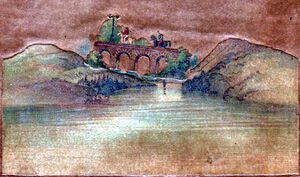
Misrepresentations of Spiritualists
Sir,—Will you allow me to correct some of the statements made in the last issue of your journal, by Mr. William Howitt, concerning the British National Association of Spiritualists—statements which are likely to mislead many of your readers as to questions of fact. I may say, at the outset, that Mr. Howitt has been living abroad for some years, and that some excuse may, therefore, be made for his imperfect knowledge of what is going on in the matter of Spiritualism in England.
Mr. Howitt thinks it necessary to warn your readers against an association which requires its members to “renounce Christianity, their utter hostility to which is every day more publicly manifested.” This sweeping and un-Christian denunciation is utterly unfounded. It is true that members of the Association are not required to make any confession of creed, any more than in the Royal Geographical Society or the Royal Institution of Great Britain. The National Association of Spiritualists was formed, as the enclosed prospectus will show you, for the purpose of “uniting Spiritualists of every variety of opinion,” and “to aid students and inquirers in their researches by placing at their disposal the means of systematic investigation into the now recognised facts and phenomena called spiritual or psychic.” In electing members to the Association, the Council avails itself of the usual precautions to insure, as far as possible, that they shall be men and women of honourable character and blameless life; but it does not inquire into, nor in any way interfere with, their religious belief. By this exercise of toleration, the Association now numbers in its ranks members of all the Churches of Christendom, including clergymen of various denominations; it goes even further, and does not exclude Jews or Buddhists. This it is which so greatly shocks Mr. Howitt, but which, I trust, will not act as a deterrent to the majority of inquirers.
Again, Mr. Howitt speaks of The Spiritualist newspaper as the u organ of the Association.” Allow me to say that the Association as yet possesses no “organ” whatever. The Spiritualist is the property of its editor, who inserts reports of the Association’s meetings, and publishes its advertisements, in the ordinary course; but he does not demand uniformity of opinion in his contributors.
I have no wish to enter into any controversy, or to express any opinion on this occasion. I only ask you, in the cause of justice, to insert this reply to Mr. Howitt’s misstatements, and to his misrepresentations of the only organised effort that has ever been made in this country to place Spiritualism before the public on a basis which precludes imposture, and which entitles it to the respect of thoughtful and scientific minds.—Your obedient servant,
38, Great Russell-street, March 23rd, 1878.
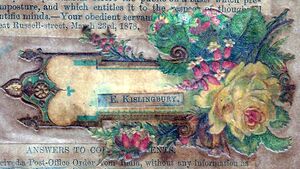
E. Kisligbury
Answers to Correspondents
We have received a Post-Office Order from India, without any information as to who sent it, or what town it came from.
A. H.—You should put your name and address to your communications.
Mrs. J. B. Mitchell, of New York, writes with some warmth that she is not a Spiritualist, but a communicant in the Presbyterian church; that she has known Madame Blavatsky for three years; that Madame Blavatsky is a truthful woman, living a good life, and that the questioning of the bona fide nature of her writings by Mrs. Showers is not well founded.
X.—We have never said a word against writers exercising their right of sending a circular to various journals, but against their doing it surreptitiously, leaving each editor to suppose he has a special contribution, when it is not one. It is a recognised breach of literary etiquette and of natural good taste. A man some time since played us this trick about four times, then denied that he had done so.
T. E., Croydon.—No connection has as yet been traced between electricity and the forces used by spirits at stances. Mr. Yarley and Mr. Harrison tried experiments on this head, with exquisitely delicate and sensitive apparatus, but the raps set up no electrical disturbance. A strong medium is usually an impulsive person, readily put to sleep by mesmeric passes. It has been said that when a strong medium is u under control,” a mortal mesmerist cannot influence him.
B.—When individuals attempt to make differences between principals, try to keep them apart, then to let a long course of slander and innuendo, from several directions, do its work. When the principals are upright people they know at once that the assertions must be false, and that they have to deal with individuals who indulge in the suggestio falsi and suppression veri, as well as in direct untruths; then, by comparing notes, they lay bare to each other the machinations of the lower camp followers hanging about their own and every other great movement. We think that a smaller proportion of these low-class people hangs about the Spiritualistic movement than about others.
Paul, the Founder of Christianity
...
<... continues on page 7-73 >
Editor's notes
- ↑ image by unknown author
- ↑ Misrepresentations of Spiritualists by Kislingbury, E., London Spiritualist, No. 293, April 5, 1878, p. 167
- ↑ E. Kisligbury by unknown author
- ↑ Answers to Correspondents by unknown author, London Spiritualist, No. 293, April 5, 1878, p. 168
- ↑ Paul, the Founder of Christianity by Wilder, Alexander, Evolution, The, September, 1877
Sources
-
London Spiritualist, No. 293, April 5, 1878, p. 167
-
London Spiritualist, No. 293, April 5, 1878, p. 168
